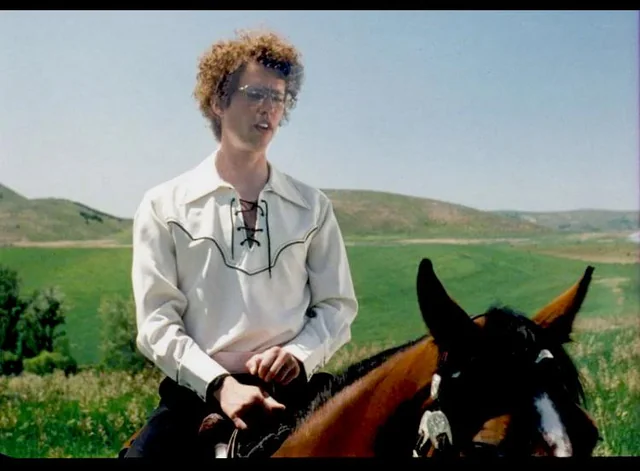Significance of Horseback Ride in Napoleon Dynamite

Napoleon Dynamite (2004) is a goofy film about an awkward boy. Unexpectedly, I found myself ruminating over the film for many days after watching it. I kept talking about aspects of the film to the point that my partner said “Now, you are officially obsessed.” Slow nothingness fills the gaps between off-beat one liners and peculiar expressions in Napoleon Dynamite, stopping me at every line to look back and think over.
What’s up with the line, I caught you a delicious bass
? After watching the film only once, I could quote many of these lines exactly as they were said in the film. I didn’t reorganize the lines in my head like “I caught a delicious bass for you,” but remembered them as whole because they were so weirdly specific. The bass is not yet delicious at the moment of catching. And “I caught you…” is not the optimal way to boast his skills in fishing or to emphasize the fact that he did it for Deb. Maybe he said it that way to avoid drawing attention to his intention out of shyness?
I couldn’t figure out how and why some lines were so significant. For example, the iconic line, Tina, you fat lard, come get some dinner!
were one of Napoleon’s most expressive words. He keeps on going in the same scene: Tina, eat. Eat the food. Eat the FOOD!
He asserts himself by telling Tina, the lama to eat four times in 13 seconds. I couldn’t stop reading into it. Why is he calling Tina, not simply fat but quite extremely, a fat lard when he is the one who wants it to eat? Why does he use his words so much when it is not at all necessary? Why is feeding Tina a sort of punishment for not doing anything useful?
And then the slowness and the nothingness—the film made me feel like I also spent my teenage boyhood in a rural American town without mentioning any of these words. I felt like I was there too. I finally started to get the American childhood stories I had heard before, even though I grew up in a city on the other side of the Pacific where I could walk to multiple schools and take trains to wherever I felt like going.
In Napoleon Dynamite, transportation symbolizes growth. Driving is a gateway to adulthood, independence, and freedom in American culture. The impact is even greater in rural areas like Preston, Idaho.
Moving about freely is the power—skill, that Napoleon lacks the most in his everyday life. The film starts with stick-figured Napoleon sharing a school bus ride with small children, portraying him like a large child.
Transportation consistently plays an important part. Napoleon asks Pedro if he takes the school bus and that leads to an elaborate observation on Pedro’s sweet bicycle. Napoleon pulls Kip to and from the town. Deb offers Napoleon a ride as a friendly/romantic signal. Rico points out that Kip doesn’t have a car and that is a problem. Napoleon is late to his date because Rico doesn’t drive him. The part where Pedro’s relatives give Napoleon a ride is a significant moment that shows his new friendship with Pedro was starting to make changes in his life.
Just before Napoleon hitchhikes Pedro’s relatives’ convertible, he makes a fruitless attempt to run to his destination. He does his best and that sincerity makes him absurd. The road is barren and infinite. Who knows how many miles of the sameness will go on before the next house, let alone Trisha’s house?
This is why, I believe, the extra random post-credit wedding scene is perfectly logical. Napoleon makes a big entrance through a hilly meadow (*cue Disney-esque soundtrack*) to Kip’s wedding on horseback, saying he is done taming a wild honeymoon stallion
—like it is a thing. Again, the stallion was not honeymoon at the time of his taming! This scene is meaningful in four ways:
- He transported himself to an event. He is no longer a 6'2" child who sits in the school bus but a proper young man who can go to places.
- While achieving this growth, he didn’t learn to drive like most people; he did it his quirky way—by taming a (somewhat fantastical) animal.
- He is giving the transportation as a wedding gift to Kip, a carless man-child so Kip completes his growth (which until this point has been through having a woman). It happens right after Kip is pronounced
as man
by the officiator/farmer. - Deb smiles big at Napoleon, hinting that she is impressed by his new skill and his unique way of doing it.
That is how the film ends. Kip’s journey completed and Napoleon’s future limitless.
Napoleon Dynamite was definitely a memorable film that left something behind after the credits. For a boy’s coming of age story that uses female characters as device for growth, this is probably the best compliment I can give. Now I have to ponder on his dreamy equestrian shirt for awhile.


